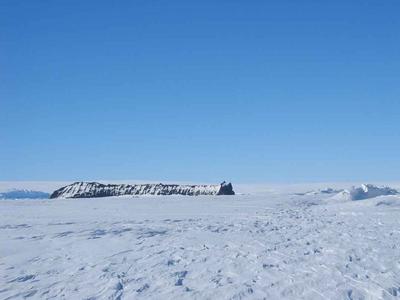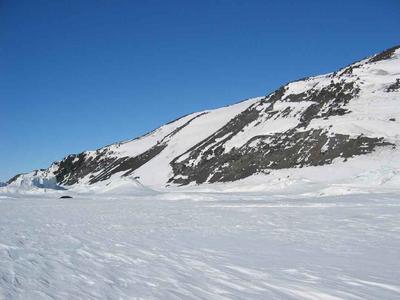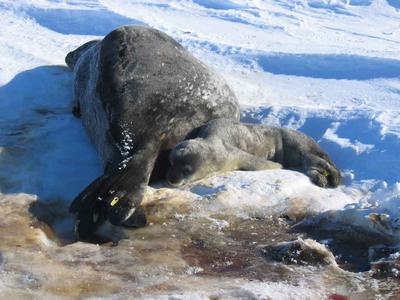3 November, 2003
Today was a tagging day. Gillian decided that, since there seems to
be an almost limitless population of untagged male seals, we would
concentrate our efforts on the females and their pups as our top
priority. While the males certainly play an important role in
maintaining the Weddell Seal population, this study's primary focus
is pups, females and survival. With that in mind, Kelly and I set
off for Little Razorback, Cape Evans, Inaccessible Island and Tent
Island to tag any new pups and their mothers. Gillian and Mark went
to North Base and Turk's Head to do the same.
It was another beautiful day-clear, windless, and quite warm
(relatively). We worked much of the day without wearing our
fashionable and warm red down parkas, putting them on only while
snowmobiling. It's definitely easier to manipulate tagging and
bagging equipment without a 5 lb jacket to weigh you down! While the
actual air temperature was perhaps only -10 or -8C, the reflection of
the sun off the surface of the snow made it feel much warmer. Add to
this the absence of wind and it was certainly a delightful day to be
out in the field.
As of today we have tagged 227 pups. This is still fewer than last
year at this time, but close to the number of pups tagged at this
time two years ago. While the absolute numbers are different from
last year, the overall trend of new pups tagged daily continues to
follow the same pattern as previous years. There are many variables
to consider when analyzing changes in a wild population such as this
one. Weather patterns, food resources, the thickness of the ice pack
and its snow cover, and daily weather patterns are just a few of the
factors which can vary markedly from year to year.
Most days each group has 15 to 20 new pups to tag. While most of the
mothers are already tagged, there are always just a few without tags.
These new moms are interesting to bag for tagging. For one thing,
they're big. Sometimes it's difficult to straddle them once the bag
is over their head, especially if they are trying to back out of the
bag or lunging forward. You just have to think fast on your feet and
go with them if they decide to bolt. Sometimes this requires just
sitting down and going along for the ride. The new mothers can be a
bit defensive, making bagging an interesting dance of advance and
retreat until the moment is right for both bagger and baggee.
One of the things I've noticed during our most recent interludes with
the pups and their mothers is that the pups are definitely growing.
Pups that were tagged two weeks ago are noticeably larger than their
newborn counterparts. Each day we see a few pups swimming with their
mothers. In a world where there is 6 weeks from birth to weaning,
you grow up quickly.
Daily Haiku:
Tagging the new pups
Older pups learning to swim
Growing up quickly

This is a view of Big Razorback Island from the north. If you look very closely, you can see our camp.

This is the northern end of Tent Island. The lumps in the snow are actually areas where the ice has been pushed up in a pressure ridge. There is a crack near this ridge that is used by the seals to access the surface.

This mother and pup both have tags in their flippers.
Contact the TEA in the field at
.
If you cannot connect through your browser, copy the
TEA's e-mail address in the "To:" line of
your favorite e-mail package.
|
